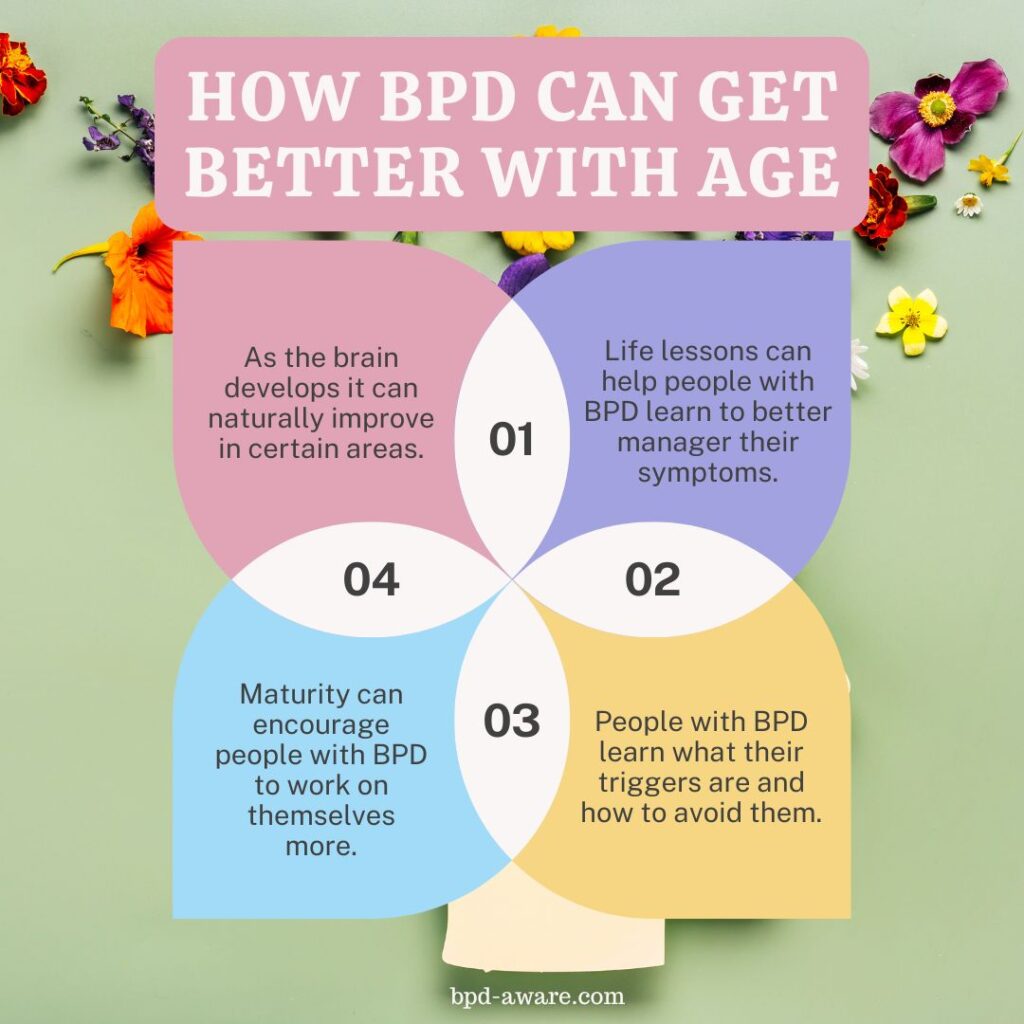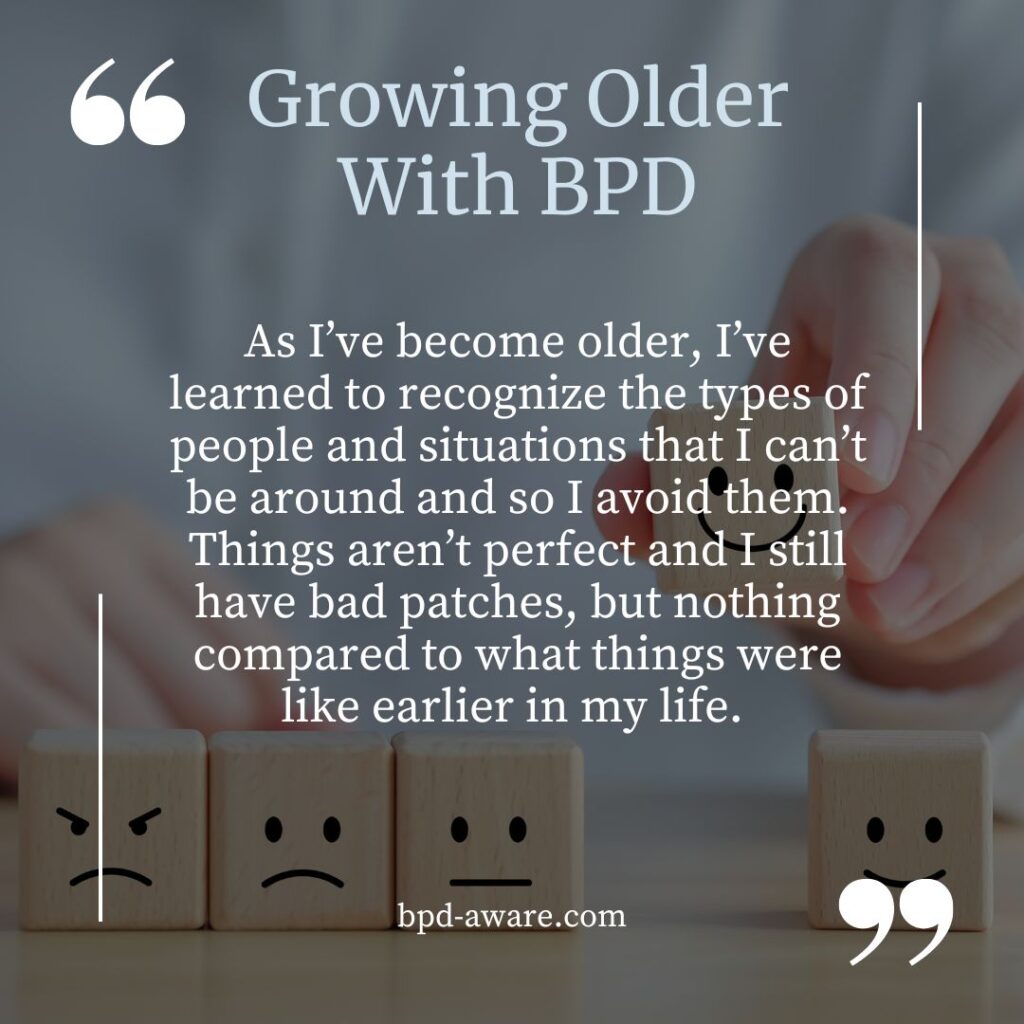There is a common belief that Borderline Personality Disorder (BPD) improves with age. Could it be true that time heals all wounds, even mental ones? Or is this just another myth surrounding BPD?
In this article, we’ll look at why BPD might get better with age for some sufferers. We’ll also dive into why that isn’t always the case, as well as the potentially disastrous consequences of trusting that things will get better with time alone.
Why BPD Can Get Better With Age
Studies on the lifetime course of BPD indicate that the disorder does seem to improve with age. In particular, impulsive behavior and outward manifestations of BPD see a quicker reduction than the more internalized manifestations of BPD, such as splitting. What research has yet to be able to conclude is exactly why this might be. However, there are several theories.
One such theory relates to the brain development of people with BPD. As noted in our article about the BPD brain, people with BPD tend to have certain parts of the brain that are underdeveloped or hyperactive. It’s not yet known whether these abnormalities cause BPD or BPD causes these abnormalities.
What we do know is that Borderline Personality Disorder typically makes its presence known during adolescence, when the brain still isn’t fully developed. The human brain normally isn’t considered to be fully developed until the mid-to-late-twenties. It could be that the brain development of people with BPD takes longer than normal and eventually catches up, or at least becomes much closer, to the norm.
This theory about brain development could be a more scientific version of the “maturing” theory. This theory states that many people with BPD simply “mature” out of their symptoms as they age. As mentioned earlier, impulsive behavior in particular seems to decline with age, and this is true of people with or without BPD. As we age, we tend to become more risk-averse and consider the consequences of our actions more. An escapade that might have seemed appealing in our early twenties becomes a needless risk in our late thirties.
Another theory is that people with BPD naturally learn how to manage their symptoms with age. Just as some people learn to become more productive, learning to control yourself better is possible. Life can find a way of teaching you important lessons which, if you learn from them, can lead to natural improvements.
On a similar note, those with BPD also learn what triggers the worst of their symptoms over time. Some may discover techniques that help them to reduce the triggering effect or they may avoid these situations as much as possible. The result is that the BPD symptoms are reduced, although avoidance isn’t always the healthiest option as it can lead to a sheltered existence. For example, some people with BPD may be easily triggered by the traditional work environment or by romantic relationships. While avoiding either (or both) of these might be possible, it can create financial problems or loneliness.
As the symptoms of BPD can improve with time, it can lead to a surprising effect. People with BPD might be more willing to seek treatment (or work on themselves in other ways) when they are more mature than they would have been in their younger days. This could be due to being more willing to accept they have faults that need to be worked on. It could be that they simply want to live a better life. Either way, age can make us more introspective and honest about who we are and what we need to do to get what we want out of life.

Why People With BPD Shouldn’t Trust That They’ll Get Better With Age
Studies have only shown that age is beneficial in reducing the symptoms of BPD, not that it will be a full recovery. A recovery is what people with Borderline Personality Disorder should be aiming for whenever possible. In some cases, it may be possible to “age out” of BPD but those are the minority of cases, not the majority.
Age won’t help everyone with BPD. Even those it does help might only experience a mild improvement rather than something life-changing.
While studies have found that many people with BPD will experience a reduction in impulsive and external manifestations of BPD, the more internalized symptoms reduce much less and at a much slower rate. That includes things like splitting, anger, fear of abandonment, chronic feelings of emptiness, and a general lack of satisfaction with life.
Trusting that age will be a cure-all wastes time that could be spent receiving treatment. We recognize that receiving treatment isn’t always possible, but this time could be spent at least actively working on the self rather than just hoping things get better with time. It might be nice to think things will improve with time, but that isn’t always the case. Sometimes, things get worse.
People with BPD often suffer from suicidal thoughts and behavior. There is no evidence that this gets better with time. We want to live in a world where everyone with BPD gets the best possible outcome, and that means putting in the work to get better.
Your Opinions On “Does BPD Improve With Age?”
Before writing this article, we asked our followers on social media what they thought about BPD improving with age. This is a selection of what they told us.
As always, names have been changed to protect identities.
“I’m in my forties and I’ve learned to live with my BPD. I’ve never gone to therapy (couldn’t afford it) but I do take medication for depression and anxiety. As I’ve become older, I’ve learned to recognize the types of people and situations that I can’t be around and so I avoid them. Things aren’t perfect and I still have bad patches, but nothing compared to what things were like earlier in my life.” – Ruth H.
“After being diagnosed with BPD at 18, I never really clicked with therapy. I always felt like I was being judged or criticized. I gave it a few tries but ultimately gave up on it. Now I’m in my fifties and I can say that things have gotten better with age. Not everything has gotten better though. I don’t feel the need to be demanding or controlling like I used to. My critical inner voice is still as bad as ever though.” – Jude G.
“I’m 37 and my BPD didn’t get any better until I found the right medication. Therapy didn’t help, age didn’t help, but medication has. No one would describe me as ‘cured’ or ‘recovered’, I’m much more even-keeled now than I used to be though.” – Rayhan M.
“Living in the US, with our healthcare system, therapy, and medication has never been in my budget. I’ve never been officially diagnosed with BPD simply because I couldn’t afford it. I suspect I’ve had BPD since my mid-teens and now I’m in my early thirties. I’ve had to force myself to learn how to cope differently than I used to. It’s been nothing if not an uphill battle. Have things improved? Maybe a little, but not a lot. Adult life is a struggle but I do have some rays of sunshine now and again. That’s what keeps me going.” – Lennon B.

Final Thoughts
There is evidence, both scientific and anecdotal, that BPD can improve with age. The exact cause of that improvement is unknown but it’s likely to be a combination of increased brain development, naturally learned coping skills, trigger avoidance, and an overall improvement in maturity.
While BPD might improve with age, this isn’t always the case. Even when BPD does improve with age, it’s more the externalized manifestations of the disorder that improve, rather than any of the internal ones. Impulsivity and outward displays of anger might reduce, but feelings of emptiness and inner anger remain.
Age and time may certainly offer some benefits and relief from Borderline Personality Disorder, but treatment is still the best path to recovery.
Sources, Resources, and Further Reading
- Does BPD Get Better or Worse with Age?: https://www.mentalcurve.com/post/does-bpd-get-better-or-worse-with-age
- How BPD Symptoms May Change With Age: https://www.verywellmind.com/why-do-bpd-symptoms-decline-with-age-425211
- Improvement in Borderline Personality Disorder in Relationship to Age: https://pmc.ncbi.nlm.nih.gov/articles/PMC2629076/
- Age-related differences in borderline personality disorder symptom networks in a transdiagnostic sample: https://www.sciencedirect.com/science/article/abs/pii/S0165032720303530
















